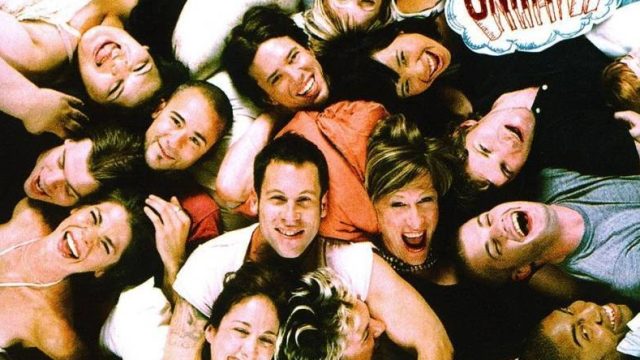This Week You Will Learn:
- Auditioning tips for a very specific situation
- The best and worst throwback movies of 2021
- What Mel Brooks predicted about the future
- What great film has been hiding out on YouTube
- Insomnia cures for baseball fans
Thanks to Miller for contributing this week. Send articles throughout the next week to ploughmanplods [at] gmail, post articles from the past week below for discussion, and Have a Happy Friday!
At Vulture, Mark Harris recalls the strange, sexy audition process for Shortbus and talks to John Cameron Mitchell about making the film in 2006 vs. 2022:
“Can you imagine the intimacy-counselor budget?” he says. “I just did [the Peacock limited series] Joe Exotic, and the counselor was very sweet, but they were saying things like, ‘Is it okay if he puts his hand on your shoulder?’ And I’m laughing, like, ‘Shoulder?!’” […] “My mantra during the movie,” he says, “was, I never want you to do anything you don’t want to do, but I always want you to challenge yourselves, because we are challenging an eroto-phobic culture — that’s one of the reasons we’re doing it. We weren’t trying to shock people. What we were trying to do was to create a relationship with the audience, and oftentimes, a relationship begins with a lot of sex.”
The writers at ReverseShot, having already provided the requisite Top 10 of the year, now give their Two Cents on the films of 2021, their wildest praises, cattiest observations, thumbs up to good efforts and least polite body slams for any and all titles that caught their attention/ire:
I don’t want to talk about Smooth Ringo. I want to talk about Peter Jackson’s inexplicable choice to conclude each day of Get Back by Ken Burns–ing out of an immersive, never-before-seen, literal Beatles rehearsal into an OfficeMax calendar graphic. At first, it’s practical: the Fab Four have a self-imposed deadline to meet, and the visual is a good way to get our bearings in January of 1969. But do we really have to watch a corny whiteboard-marker “X” slash each day away? What began as a mild annoyance evolved into a betrayal of trust when that dreaded grid swallowed up—nay, inhaled like a vacuum—the first full-band performance of “Let It Be.” As George’s solo faded out right as it was getting started, I wondered: What else did Jackson snip out of the edit? Maybe they stopped playing midway through and Jackson wanted to preserve the illusion of an unbroken jam session. Still, consider the calendar. How can you trust that kind of judgment?
At The Reveal, Keith Phipps finds a warning about the future in the 1970s Mel Brooks flick Silent Movie:
“I told them that somehow we should get an engine that pulled our picture along,” Brooks recalls in his 2021 memoir All About Me!: My Remarkable Life in Show Business. “Something underneath the fun and frolic that drove our movie forward. We came up with a great engine: money versus art.” He didn’t have to look far for inspiration. “Big commercial companies that had nothing to do with the art of entertainment but were loaded with money were gobbling up old traditional movie studios just for their financial value.” In 1966, Gulf + Western bought Paramount Pictures. One year later, Transamerica bought United Artists, a studio founded on an idea of artistic independence. In 1982, Coca-Cola would buy Columbia. Brooks couldn’t have known that at the time, but it undoubtedly wouldn’t have surprised him. He knew an alarming trend when he saw one.
Richard Brody at The New Yorker evangelizes on behalf of the self-interrogating documentary Who Killed Fourth Ward?:
One of the great modern documentaries is hiding in plain sight. “Who Killed Fourth Ward?,” directed by James Blue, from 1978, is available on YouTube, on a channel devoted to his work. It’s also part of a Blue retrospective at Metrograph, starting Friday, along with his most celebrated movie, the rarely screened and newly restored dramatic feature “The Olive Trees of Justice,” from 1962. That feature is vital, but “Who Killed Fourth Ward?” is life-changing: it overturns long-standing and deep-rooted expectations about the practice and results of documentary filmmaking. What’s more, although “Who Killed Fourth Ward?” is in three parts, each about an hour long, it’s the quickest three hours I’ve seen on film in quite a while.
Nenseh Alexis Koneh describes how cosplaying gave her confidence for gal-dem:
Getting into cosplay felt like a resurrection of myself because all forms of creativity were stripped from me until now. When I was growing up, I believed I wouldn’t go far in life unless I choose a career path with credibility and stability. Lawyer, doctor, scientist, were some of the few occupations that were permanently ingrained as aspirational. However, I knew deep down inside that I wanted to make time and space for a creative outlet.

